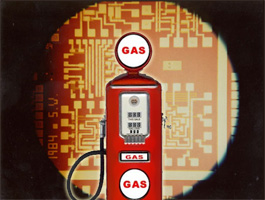
Misplaced Anger
Motorists often believe that gas station dealers control the price of gasoline, but the fact is -- the oil companies, which are often the supplier and the landlord, dictate price. In most cases rent on a station is based on volume -- the more gasoline (gallons) sold the lower the rent. The other factor which enters into the figure, is local competition. To maximize the efficiency of the equation, most gasoline dealers operate on very small margins, "pool margins" are often 4 to 8 cents a gallon. Let's do some math. Let's say that a dealer has a unit that competition keeps at a 5-cent (.05) margin. If the dealer sells 150,000 at a .05 margin then the gross profit would be around $7,500. Rent can vary greatly based on the oil company's method of calculating rent and rebates. It is not unusual for this type of unit to rent for $15,000 a month at zero (0) gallons. The oil company may allow a $1000 rent credit or rebate of $1000 for every 1000 gallons over a base amount such as 140,000 gallons. This would result in a rent reduction of $5000, the equation then becomes:
These figures are affected by fluctuations in margin and volume... Another example of what happens in a rising price marketA rising price market, almost always results in a loss of volume. Contrary to popular belief most customers buy a fixed dollar amount, not a "fill-up." A typical customer purchases $10.00 of gasoline per visit.
The dealer must maintain volumeCoupled with rent penalties for selling less volume, there is significant incentive for the dealer to keep prices down. So as can be seen the dealer stands to profit by lower prices not higher prices.Bibliographic Entry
Gigliotti, Lorenzo. "Gasoline Prices." The Random Times
Home Click to The quixotic mind of Lorenzo Gigliotti All rights reserved © 2004 FG Enterprises, Long Beach, California |
